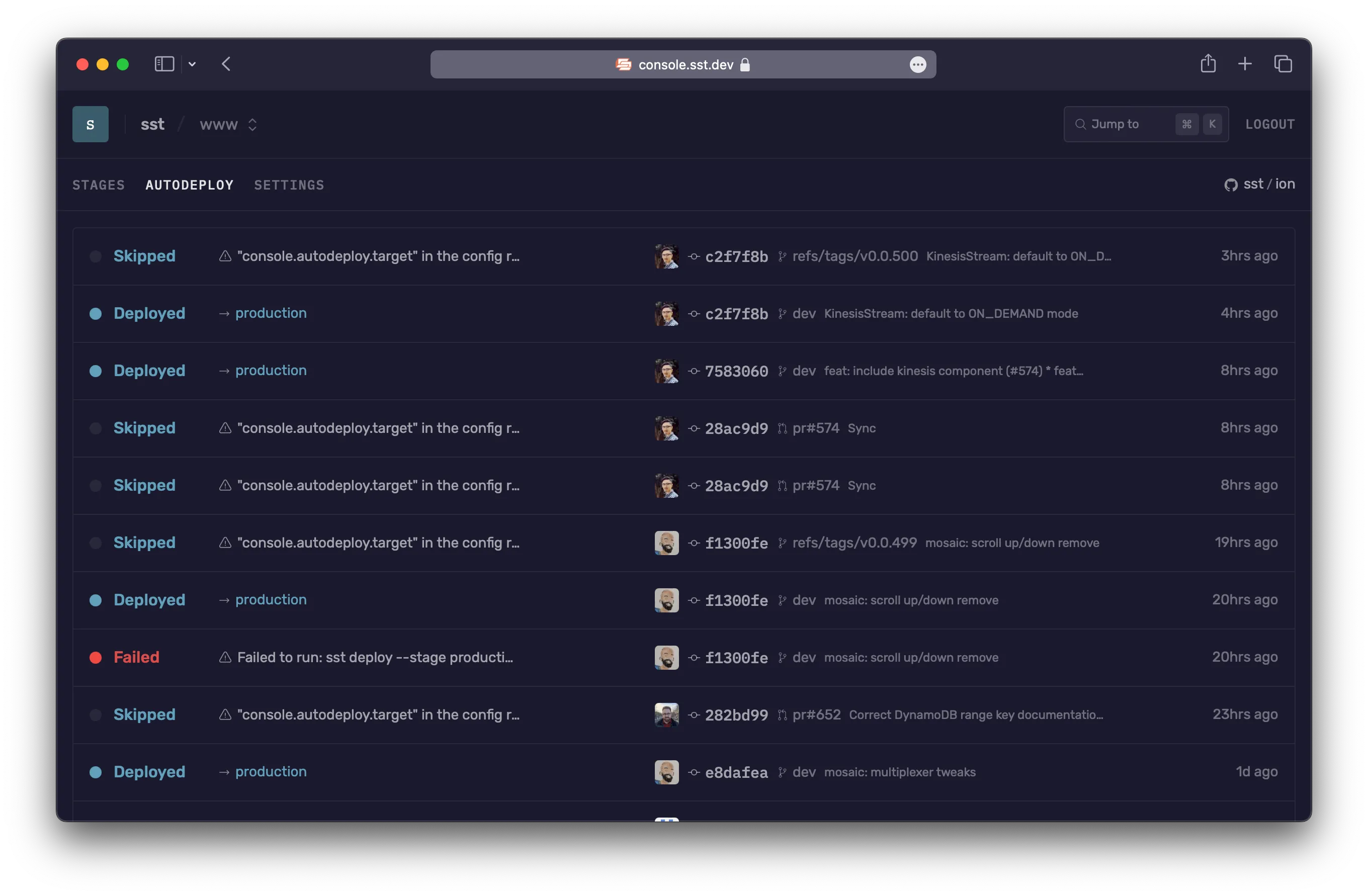Analog on AWS with SST
We are going to create an Analog app, add an S3 Bucket for file uploads, and deploy it to AWS using SST.
Before you get started, make sure to configure your AWS credentials.
1. Create a project
Let’s start by creating our project.
npm create analog@latestcd aws-analogWe are picking the Full-stack Application option and not adding Tailwind.
Init SST
Now let’s initialize SST in our app.
npx sst@latest initnpm installSelect the defaults and pick AWS. This’ll create a sst.config.ts file in your project root.
It’ll also ask you to update your vite.config.ts with something like this.
plugins: [analog({ nitro: { preset: "aws-lambda", }})],Start dev mode
Run the following to start dev mode. This’ll start SST and your Analog app.
npx sst devOnce complete, click on MyWeb in the sidebar and open your Analog app in your browser.
2. Add an S3 Bucket
Let’s allow public access to our S3 Bucket for file uploads. Update your sst.config.ts.
const bucket = new sst.aws.Bucket("MyBucket", { access: "public"});Add this above the Analog component.
Link the bucket
Now, link the bucket to our Analog app.
new sst.aws.Analog("MyWeb", { link: [bucket],});3. Generate a pre-signed URL
When our app loads, we’ll generate a pre-signed URL for the file upload on the server. Create a new src/pages/index.server.ts with the following.
import { Resource } from 'sst';import { PageServerLoad } from '@analogjs/router';import { getSignedUrl } from '@aws-sdk/s3-request-presigner';import { S3Client, PutObjectCommand } from '@aws-sdk/client-s3';
export const load = async ({ }: PageServerLoad) => { const command = new PutObjectCommand({ Key: crypto.randomUUID(), // @ts-ignore: Generated on deploy Bucket: Resource.MyBucket.name, });
const url = await getSignedUrl(new S3Client({}), command);
return { url };};And install the npm packages.
npm install @aws-sdk/client-s3 @aws-sdk/s3-request-presigner4. Create an upload form
Add the upload form client in src/pages/index.page.ts. Replace it with the following.
import { Component } from '@angular/core';import { FormsModule } from '@angular/forms';import { injectLoad } from '@analogjs/router';import { toSignal } from '@angular/core/rxjs-interop';
import { load } from './index.server';
@Component({ selector: 'app-home', standalone: true, imports: [FormsModule], template: ` <form (ngSubmit)="onSubmit($event)"> <input type="file" name="file"> <button type="submit">Upload</button> </form> `,})export default class HomeComponent { data = toSignal(injectLoad<typeof load>(), { requireSync: true });
async onSubmit(event: Event): Promise<void> { const file = (event.target as HTMLFormElement)['file'].files?.[0]!;
const image = await fetch(this.data().url, { body: file, method: 'PUT', headers: { 'Content-Type': file.type, 'Content-Disposition': `attachment; filename="${file.name}"`, }, });
window.location.href = image.url.split('?')[0]; }}Here we are injecting the pre-signed URL from the server into the component.
Head over to the local Analog app site in your browser, http://localhost:5173 and try uploading an image. You should see it upload and then download the image.
5. Deploy your app
Now let’s deploy your app to AWS.
npx sst deploy --stage productionYou can use any stage name here but it’s good to create a new stage for production.
Connect the console
As a next step, you can setup the SST Console to git push to deploy your app and monitor it for any issues.

You can create a free account and connect it to your AWS account.